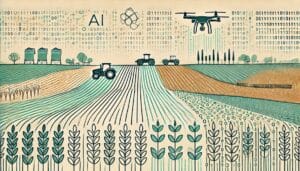In today’s rapidly evolving world, artificial intelligence (AI) is revolutionising the way we work, redefining industries, and reshaping the job landscape. As AI technologies continue to advance, the future of work is both exciting and challenging. In this article, we’ll explore the profound impact of AI on the world of employment, discussing its implications, opportunities, and strategies for individuals and businesses to navigate this transformative era.
The AI Revolution
AI, in the form of machine learning, natural language processing, and automation, has already made significant inroads into the workplace. Here’s a glimpse of how AI is influencing the world of work:
Automation: AI-driven robots and software automate repetitive, routine tasks in manufacturing, logistics, and customer service, improving efficiency and reducing costs.
Data Analysis: AI algorithms analyse vast datasets to uncover insights and trends, aiding decision-making in finance, marketing, and healthcare.
Customer Service: Chatbots and virtual assistants handle customer inquiries, offering round-the-clock support and freeing up human agents for more complex tasks.
Personalisation: AI-driven recommendation systems deliver tailored content and products to users, enhancing customer experiences.
Predictive Maintenance: AI predicts when equipment and machinery require maintenance, reducing downtime and costs in industries like manufacturing and aviation.
Content Generation: AI-generated content, such as news articles and product descriptions, is becoming more prevalent, saving time and resources.
The Impact on Jobs
The integration of AI into the workplace has sparked debates about job displacement and the future of employment. While some jobs may be automated, AI also creates new opportunities:
Job Displacement: Routine, manual, and repetitive jobs are more susceptible to automation. Roles in manufacturing, data entry, and customer support may decline.
Job Augmentation: AI enhances human capabilities and productivity, creating demand for roles like data scientists, AI trainers, and automation specialists.
New Jobs: AI stimulates the creation of entirely new job categories, such as AI ethics consultants, AI trainers, and AI solution architects.
Reskilling and Upskilling
To thrive in the AI-driven workplace of the future, individuals and organisations must prioritise continuous learning:
Lifelong Learning: Individuals should embrace a culture of lifelong learning, acquiring new skills and staying updated with technological advancements.
Upskilling: Employers should invest in upskilling their workforce to adapt to new technologies and remain competitive.
Soft Skills: Skills like creativity, critical thinking, emotional intelligence, and adaptability become increasingly valuable as AI takes over routine tasks.
AI Ethics and the Workplace
AI introduces ethical considerations related to bias, privacy, and transparency. It’s essential for businesses to adopt responsible AI practices and adhere to ethical guidelines:
Bias Mitigation: Efforts should be made to reduce biases in AI algorithms to ensure fair treatment of all individuals and groups.
Data Privacy: Protecting the privacy of employee and customer data is paramount, with strict compliance with data protection regulations.
Transparency: AI decisions should be explainable and transparent, allowing users and employees to understand the reasoning behind AI-driven choices.
Collaboration between Humans and AI
The future of work isn’t about humans versus machines; it’s about humans working alongside machines to maximise productivity and innovation. AI can handle repetitive tasks, analyse data, and offer insights, while humans contribute creativity, empathy, and strategic thinking.
Conclusion
AI is reshaping the world of work, offering new opportunities, and driving productivity gains. As AI continues to evolve, individuals and organisations must adapt, embrace lifelong learning, and prioritise ethical practices. By fostering a symbiotic relationship between humans and AI, we can navigate the changing landscape of work and unlock the full potential of this transformative technology.
Stay updated with the latest AI news. Subscribe now for free email updates. We respect your privacy, do not spam, and comply with GDPR.



